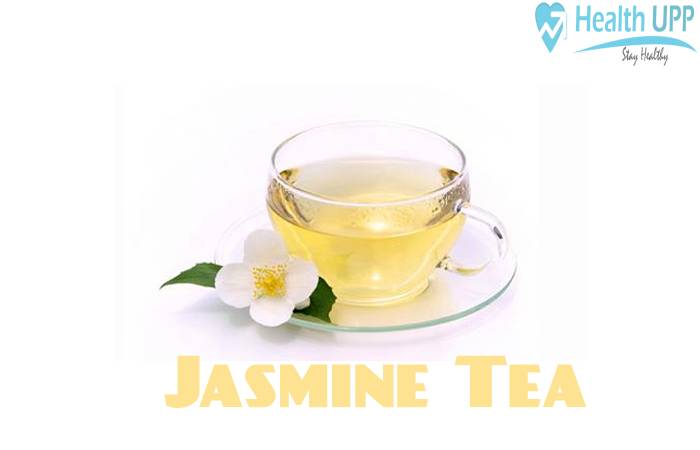Jasmine Tea Benefits – Jasmine tea is an easy and nutritious drink to add to your diet. You can consume it in a tea bag, in loose leaves or in the form of pearls. Jasmine tea is a sort of tea scented with the scent of the flowers of the jasmine plant.
It is usually based on green tea, but sometimes white or black tea is used. Common jasmine (Jasminum officinale) or sampaguita (Jasminum sambac) flowers are stored with tea leaves or mixed with stored tea, giving it the aroma.
Since jasmine tea is typically made from green tea leaves, it provides many of the powerful health advantages that arise from drinking green tea
Jasmine tea is flavored or fragrant tea. Fragrant teas are made by adding flowers, fruits, spices, oils, extracts, or other ingredients to traditional tea leaves from the Camellia sinensis bush for extra flavor.
What is Jasmine Tea?

Enjoyed hot or cold tea, jasmine tea first gained popularity in China during the Ming Dynasty. Its popular in Asia and around the world has a lot to do with its supposed body health benefits and sweet and delicate aroma.
One of the most famous jasmine teas comes from China’s Fujian region, where it made from jasmine flowers. Commercially made jasmine teas can made with jasmine oil or other flavorings.
How to Prepare Jasmine Tea
Jasmine tea usually made from green tea leaves or leaves that have not fermented. However, the tea can also make from black tea leaves (which have fully oxidized), oolong tea leaves (partially oxidized), or tea. Whitened growth shoots and young leaves.
You can make jasmine tea from the cut by adding freshly picked jasmine petals. However, buying dry tea or tea bags is more convenient and safer. Certain jasmine varieties are poisonous, so buying them from a reputable green tea shop is better than making them in the garden. Jasmine pearl tea is a hand-rolled tea mixed with jasmine flowers.
How to Make the Classic Cup of Jasmine Tea
- Boil water (filtered water is ideal). If you are using a kettle, set the temperature to 175 degrees.
- Put your tea in a kettle and add the hot water.
- Cover and let stand for 3 minutes.
- Strain the loose tea or take out the tea bag and pour it into your favorite mug.
Enjoy!
To make cold iced tea, put the tea in a jug of water and let it steep for 6 to 12 hours at room temperature. Strain and refrigerate to cool or pour over ice. Some people prefer some milk, honey, or sugar with jasmine tea.
Does Jasmine Tea Contain Caffeine?
Jasmine tea contains as enough caffeine as the base tea it is made from. Both green and black teas contains caffeine. Green tea contains between 9 and 63 milligrams per 8-ounce serving, and black tea contains 42 to 79 milligrams per 8-ounce serving.1 By comparison, a typical cup of coffee contains about 100 milligrams of caffeine.
Health Benefits
Since most commercially available jasmine tea blends do not contain real flowers (but are perfumed with essential oil or fragrance), various jasmine tea benefits mainly come from the green or black tea leaves to drink.
Caffeine provides a temporary metabolism and a mental boost. Still, it can cause negative side effects if you are very sensitive to it or ingest large doses (more than 200 milligrams per day), especially during pregnancy.
Both black and green tea contain polyphenols, which include catechins, flavonoids, and tannins. Researchers have link the consumption of flavonoids to several beneficial health outcomes because of their antioxidant effects. However, scientists warn that more research is needed to ensure that tea can significantly improve your health.
Some tea drinkers trust that jasmine tea can help them find peace of mind before bed. However, these benefits have not proven in clinical studies. If you drink tea to relax before bed, make sure it’s decaffeinated. The simple ritual of taking some time to drink tea is likely to offer stress-reducing benefits.
And Other Jasmine Tea Benefits
In addition to its unique aroma and taste, jasmine tea has many beneficial properties that help reduce stress and heart attacks and improve the digestive system. Let’s take a closer look at them.
Weight loss
Everyone is looking for the super-secret to losing weight quickly and easily, and jasmine tea can be a better addition to any diet as a weight loss aid. The antioxidant properties of jasmine tea increase your metabolism. This increase in metabolic efficiency makes your workouts effective and helps your body process nutrients faster. A faster or more efficient metabolism will help you lose weight but should be used as a supplement, rather than as a standalone solution, in addition to other weight loss techniques.
Antioxidant Properties
Perhaps the most lauded aspect of jasmine tea is the high antioxidant content in this delicate and delicious drink. The most notable antioxidants in jasmine tea are catechins. Green tea is one of the commonly used base flavors for jasmine tea. However, depending on the type of tea used as the base, different antioxidant properties can achieved. For example, black tea is high in theaflavins, while green tea is high in catechins.
Antioxidants work to detect and destroy harmful substances or free radicals that can cause disease and affect the immune system. As mentioned above, catechins are the antioxidants that most jasmine tea consumers are looking for. They have shown to be comprehensive in preventing certain serious diseases in the body.
Protects Heart Health
For the person who has a personal or family history of cardiovascular problems, jasmine tea can help prevent further problems. The catechins in jasmine tea are a key factor in inhibiting LDL oxidation when the “bad” cholesterol becomes inflamed after oxidation. This swelling of the veins and arteries can lead to a heart attack or stroke. The catechins contained in jasmine tea inhibit this oxidation process and thus lower blood pressure and cholesterol levels. Long-term threats like heart disease can prevented.
Prevents Cancer
Fighting cancer is one of the top health problems around the world. Therefore, anything that can help prevent cancer is always popular. Research studies suggest that drinking tea like jasmine tea can help prevent cancer. All green teas made from jasmine have widely shown to have cancer-preventing properties because they contain polyphenols such as epigallocatechin gallate (EGCG). Polyphenols like EGCG are important defense lines against free radicals and other harmful or carcinogenic invaders in the body. Green/jasmine tea has shown to reduce the risk of breast cancer, lung cancer, and many other diseases.
In addition to adding EGCG to the system, green tea elements also inhibit the overexpression of dangerous enzymes commonly found in tumors and cancer cells.
Control Diabetes
Jasmine tea has proven to be a valuable tool in the fight against diabetes. The ability to metabolize glucose is the basic mechanism that causes diabetic conditions. Drinking green/jasmine tea can reverse the negative effects of diabetes on certain serum proteins. It acts as a regulator for people with diabetes and a preventive measure for those who have not been diagnosed but still consume it regularly as part of their health plan.
Relieve the stress
The olfactory system often overlooked, but it can be a very strong sense, and studies have shown that the smell of jasmine can be very beneficial to certain test subjects. Those test subjects who have a natural preference for the scent of jasmine are parasympathetic to odors, and their bodies release chemicals that allow them to relax naturally or to improve their mood. However, the smell of jasmine is referred to by some as “acquired taste.” Some studies have shown that people who do not enjoy the smell of jasmine can become anxious when exposed to it at high intensity.
Side Effects
Jasmine generally seen as safe by the US Food and Drug Administration. Pregnant women should consult their doctor before drinking jasmine tea. Any drink that contains caffeine can cause side effects, especially if consumed in large quantities. Headaches, nervousness, tremors, or difficulty sleeping can cause too much caffeine in tea and other beverages.
